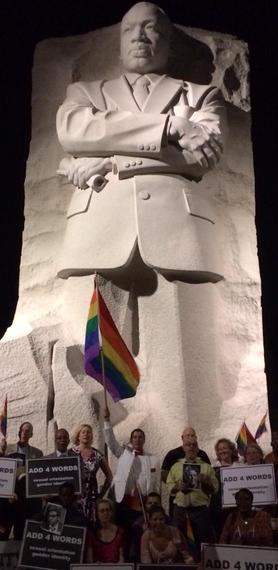Last Thursday, Senate and House Democrats, 205 in all, introduced the Equality Act (S.1858/H.R.3185). Decades in the making, and not introduced since 1974 when Bella Abzug and Ed Koch were its Congressional sponsors, it's the first comprehensive and inclusive piece of federal legislation to cover the entire LGBT community in all the traditional realms of civil rights. Its purpose is to amend the 1964 Civil Rights Act (CRA) to include gender identity and sexual orientation.
While such a bill has been discussed for many years, the modern version got its first push in 2009 with the promulgation of The Dallas Principles. Todd "Tif" Fernandez, inspired by the manifesto, ran with it and kept at it for years, often alone, with his "Add 4 Words" campaign. The high point for this campaign was a vigil at the MLK Memorial in DC on June 30, 2014, also attended by Richard Noble.
Richard Noble, inspired by Tif, walked across America in 2011-12 for 15 months to spread the gospel of what was then called the American Equality Bill, originally drafted by lesbian civil rights attorney, Karen Doering.
The current bill stands out in several ways from the long-running versions of the Employment Nondiscrimination Act (ENDA), which much of the community decided to jettison last year in favor of this much more comprehensive bill. Like ENDA since 2009, it is fully inclusive, covering gender identity and expression as well as sexual orientation. That is today's reality, and will not be a bargaining chip.
Unlike ENDA, which only covers employment, the sphere that is in least need of codification today because of coverage of the entire LGBT community under Title VII since the recent EEOC ruling in the Foxx case (and the 2012 ruling for trans persons in the Macy case), it is far more comprehensive:
•Unbeknownst to most Americans, Title II, the Public Accommodations section of the Civil Rights Act, does not prohibit discrimination on the basis of sex. Most Americans, however, believe this to be the case, which is why you rarely hear about discrimination against women in the public sphere, even without an Equal Rights Amendment. This bill would add the category, "sex," which already covers gender identity and sexual orientation by virtue of rulings by the EEOC and other federal agencies and courts, as well as explicitly add those two terms. It also expands the definition of "public accommodations" way beyond the original grouping of "hotels, motels, restaurants, theaters, and all other public accommodations engaged in interstate commerce," to a much more modern definition.
• Title IV, which covers public education in K-12 and higher ed, and already prohibits sex discrimination, and Title VI, which covers the general distribution of federal funds, will be updated to include sexual orientation and gender identity (as well as sex in Title VI).
•Other associated laws, from the '60s and '70s, such as Title VIII ( known as the 1968 Fair Housing Act), the Jury Selection and Service Act of 1974, the Equal Credit Opportunity Act of 1974, the Civil Service Reform Act of 1978, the Congressional Accountability Act of 1995, the Government Employees Rights Act of 1991, and Title XI, dealing with access to a jury trial for criminal defendants accused of contempt in a matter arising under the CRA, will be updated to cover gender identity and sexual orientation.
•The bill includes the usual expansion of protections to include those perceived or believed to be LGBT, even if the belief is inaccurate, as well as including those who suffer due to association with LGBT persons, such as family members, including spouses, partners and children.
•The bill defines gender identity as "the gender-related identity, appearance, mannerisms or other gender-related characteristics of an individual, regardless of the individual's assigned sex at birth," and "sex," throughout the bill, is defined to include gender identity and sexual orientation. It also protects persons from being denied use of the appropriate sex-segregated facilities such as locker rooms and bathrooms.
•The amendments do nothing to the religious exemptions already present in the CRA, which are narrow and limited to the ministerial exemption which protects religious institutions from being forced to hire members of another faith. It also prohibits any claims, or defense to a claim, under the federal Religious Freedom Restoration Act of 1993 (RFRA) statute. This issue, as we already know, is the major stumbling block for those Republicans who are willing to consider support for the antidiscrimination protections. No Republican signed on as an original cosponsor.
•This bill amends arguably the most important law in American history, the 1964 Civil Rights Act. It is not a standalone bill. The advantage to proceeding in this fashion is to take advantage of the half century of case law flowing from this Act. Judges all understand the CRA and are constrained by it and the cases that have occurred since then. Those include cases which have been decided by the Supreme Court, such as Price Waterhouse v. Hopkins of 1989, which set the standard for the past quarter century of sex discrimination law, including the Macy (trans protections) and Baldwin (gay protections) decisions. A standalone law would be open to fresh and politically motivated interpretations.
•The flip side of this strategy is that the CRA is then opened up to malicious amendments from hostile Republican House and Senate majorities. While the Democratic sponsors have emphasized repeatedly that their first principle is the Hippocratic one, "First, do no harm," buy-in from the Congressional Black Caucus (CBC), the NAACP, and, most importantly, the Leadership Conference on Civil and Human Rights (LCCHR), is slow in coming. The LCCHR is still in the process of vetting the bill fully, the NAACP is not on board yet, and only 60 percent of the CBC has signed up to co-sponsor.
The bill was introduced -- what now? Check out my next column.

